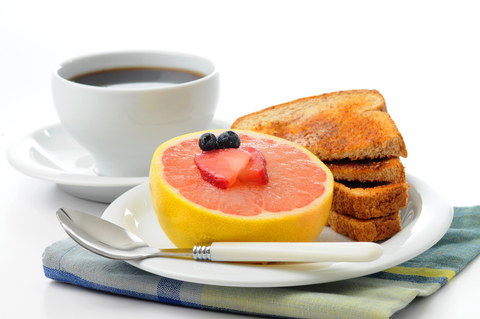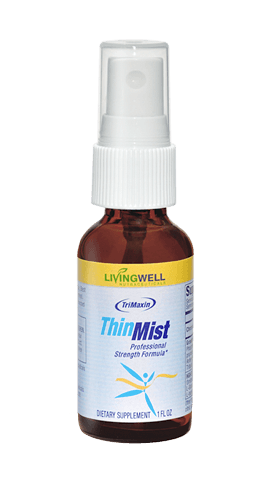AVOID These Medicines with Grapefruit
 The average American adult takes nearly 12 prescription drugs a year. If you’re over 65, that number rises to 28.[i]
The average American adult takes nearly 12 prescription drugs a year. If you’re over 65, that number rises to 28.[i]
Most people are well aware of the need to check for contraindications between multiple medications they’re taking, but the foods you eat can sometimes prove problematic, too.
Grapefruit, in particular, poses a grave threat when eaten alongside an increasing number of drugs. In fact, over the last four years, more than six new drugs have been uncovered each year that may cause fatal side effects when mixed with grapefruit.[ii]
More Than 85 Drugs are Risky When Taken With Grapefruit
The problem with grapefruit is a substance it contains called furanocoumarins, which interferes with an enzyme that helps break down medications in your body. Because of this, taking a medication with grapefruit may multiply its effects, as though you’ve taken five or 10 pills instead of just one, according to pharmacologist David Bailey, the lead author of a new review on the subject.[iii]
The paper found that more than 85 drugs may interact with grapefruit, and those that may cause potentially fatal side effects increased from 17 to 43 in the past four years alone.[iv]
While some drugs will only interact with grapefruit if they’re taken shortly after its consumption, others can still be affected if the grapefruit was consumed 12 hours or more before the drug is taken. Half of the drugs identified may even cause sudden death and life-threatening reactions including kidney or respiratory failure, gastrointestinal bleeding and more.
Some of the riskiest drugs to consume with grapefruit include:
- Cholesterol-lowering statins, including Lipitor, Zocor, Mevacor and Altoprev
- Plavix, an anti-clotting heart/stroke medication
- Certain antibiotics
- Calcium channel blockers used to treat high blood pressure
- Certain cancer-fighting drugs
- Drugs used to suppress the immune system if you’ve received an organ transplant
- Antidepressants, such as Zoloft
- Anti-anxiety medications, such as Buspirone
- Anti-seizure drugs, such as Carbatrol and Tegretol
- Allegra, an antihistamine
The risks are highest among those 45 and over, who take more medications and are typically among those who consume the most grapefruit. Certain other citrus fruits, such as limes, pomelos and Seville oranges, also contain furanocoumarins, and therefore may have similar effects.
Even a small amount of grapefruit can produce a potentially dangerous drug interaction, so if you’re taking any medications and you enjoy grapefruit, be sure to specifically ask your physician and pharmacist if this could be a problem. Don’t simply assume that your doctor would have warned you … as Bailey and colleagues wrote:[v]
“Unless health care professionals are aware of the possibility that the adverse event they are seeing might have an origin in the recent addition of grapefruit to the patient’s diet, it is very unlikely that they will investigate it … We contend that there remains a lack of knowledge about this interaction in the general health care community.”
Grapefruit is Ordinarily a Healthy Food …
If you’re not taking any medications, or those that interact with grapefruit, remember that this fruit is an excellent source of vitamin C, fiber and the antioxidant lycopene (in pink and red grapefruit only), the regular consumption of which is likely to benefit your health.
 You’ve probably also heard of the “grapefruit diet,” which is supposed to prompt rapid weight loss. Unfortunately, any weight lost during a grapefruit diet is likely to be fluids, which will be promptly replaced when you go back to eating normally.
You’ve probably also heard of the “grapefruit diet,” which is supposed to prompt rapid weight loss. Unfortunately, any weight lost during a grapefruit diet is likely to be fluids, which will be promptly replaced when you go back to eating normally.
(If you’ve been relying on grapefruit as a weight loss tool, do yourself a favor and try 100% natural ThinMist spray to speed your weight loss and boost your metabolism and HGH ‘youth’ hormones instead.)


I have experienced the grapefruit and medication problem, I had 1 antihistamine with a glass of foxy flavoured water, the flavour was grapefruit, I felt dizzy and very strange for a few hours afterwards, its so important that people are made aware of this mix, I can’t even imagine the grapefruit flavoured water even had much grapefruit in it.
Western people have strange practice when it comes to taken medication. Most of them take drugs or medication with juice or any kind of beverage and flavored drinks. Doctors do not warn them and give complete instruction how to take medication. According to my knowledge of taken medication. Any kind of drugs or medication must strictly taken with plain water or still water. not even fishy water. The very reason of this is. It loses the effectiveness of drugs. It means the drugs you are taken is useless. It won’t work to heal you sickness if taken with colored or flavored water. Hope this is clear to all the readers especially those who take medication. Beware and be wise when taken medication.
Thanks and MERRY XMAS;
I just received my Heal n soothe, is this one of the drugs i should not eat grapefruit with.?
Tom,
There is no restriction for the consumption of grapefruit with the enzymes
steve